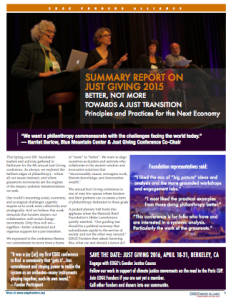
This spring, 200+ foundation leaders and activists gathered in Baltimore for the 4th annual Just Giving conference. As always, we explored the farthest edges of philanthropy: where all our issues intersect, and where grassroots movements are the engines of the deeper, systemic transformations we seek.
Our world’s mounting social, economic, and ecological crises demand this courageous and radical work of us. We cannot make progress apart, in tidy groups of philanthropists. Instead, we are called to collectively identify and align ourselves as funders and activists working together toward a “just transition” that decommodifies nature, reimagines work, liberates knowledge, and democratizes wealth.
This April, as we assessed the essential components of this transition toward a socially, economically and ecologically just world, we found ourselves—again and again—confronting enclosures. Enclosures are the private appropriation of resources—and even decision-making—previously held and managed in common.
So, craving an alternative collaborative economy grounded in the commons—that promotes the common good—we ask:
- How are nature, work, knowledge and wealth being appropriated for private ends?
- How can such enclosures be resisted, and transcended?
- How are local, translocal and transnational movements engaging in this work?
- How can philanthropy support their efforts?
The 2015 Just Giving conference stirred that pot. Over three days, this April, we collected as funders and donors, activists and organizers, next economy entrepreneurs, and visionaries to confront contemporary economic, political, and social norms that are endangering us all. Then we explored what we mean by “Better, Not More”.ext
What’s Special About the Just Giving Conference?
EDGE Funders is a place within philanthropy where we explore both justice funder tactics and the deeper philosophical ideas that animate contemporary politics, economics and culture.
We invite you to join EDGE Funders in the zone of productive discomfort, where generative thinking and revolutionary solutions arise. It is true that even the combined financial, intellectual, and political power of all EDGE members is not enough to fully confront our economic, ecological, and social crises. It is also true that by aligning ourselves with growing grassroots movements, and by seeding outrageous ideas and beautiful experiments, better systemic solutions will emerge.We invite you to join EDGE Funders in the zone of productive discomfort, where generative thinking and revolutionary solutions arise. It is true that even the combined financial, intellectual, and political power of all EDGE members is not enough to fully confront our economic, ecological, and social crises. It is also true that by aligning ourselves with growing grassroots movements, and by seeding outrageous ideas and beautiful experiments, better systemic solutions will emerge.
Watch the Just Giving Conference Promo Film
Better, Not More
“More” is the orthodoxy of infinite economic growth that ignores our reality: we have only a single planet’s worth of resources. “More” means that modern capital accumulation depends on harmful exploitation of our people and our environment, grows inequality, poisons democratic governance. This is why the packed plenary hall burst into applause when the Boell Foundation’s Heike Loeschmann quietly asserted, “Our guiding star should be a political economy…that subordinates capital to the service of society and not the other way around.”
For us, in contrast “better” looks like Buen Vivir, Ubuntu, Ujamaa, Sumak Kawsay—these ancient and now revolutionary concepts that demand a return to the Commons; and active “Commoning”.
What Can or Should a Donor Do?
Most funders and donors are proud to be accountable: careful listeners and allies in the community; responsible stewards of our endowments; attentive to our grant partners’ integrity and effectiveness; dedicated to measurable impact. Yet we know this is not enough in the face of the injustices our movement allies work to correct.
Knowing this, we are learning to thrive in a liminal place—that transformative and in-between time when—as Richard Rohr explains—“…you’ve left the tried and true, but have not yet been able to replace it with anything else.”
So during our 20+ rich workshops, ad hoc meetings, and engagement labs we examined from every angle the question, “What is an alternative collaborative economy where nature, work, knowledge & wealth are shared?” Echoing plenary speaker Firoze Manji’s reminder that “Thinking is a product of struggle, not the other way around,” we learned from fellow funders and movement partners who are experimenting across the spectrum of visionary and oppositional solutions.
Community Dialogues
Your Voices
We gathered at our tables after every plenary, every day, to synthesize what we’d heard and bring forward our collective intentions. These blended small group discussions were highly-rated. Some powerful themes emerged:
- We need to build a broader, more inclusive movement within philanthropy. One with a shared agenda. We need to take risks, and develop big, audacious responses to the crises we face.
- Systemic change starts with a movement that relishes and encompasses all forms of diversity: human, ecological, and economic.
- We are working on similar issues but calling them different names. Let’s align our language to amplify our storytelling.
- We need to raise up “new economy” working models that are shifting economic control to the people and building community wealth.
- We need to build confidence that “better” is possible. Until we get there, we need to learn how to live with ambiguity and experimentation.
Next Steps
- Save the date for Just Giving 2016: April 18-21 in Berkeley, California
- Become a member of EDGE Funders Alliance
- Join EDGE members at the COP21 UN Climate Change Conference
- EDGE Funders’ Just Transition leadership program for global justice grant makers.
